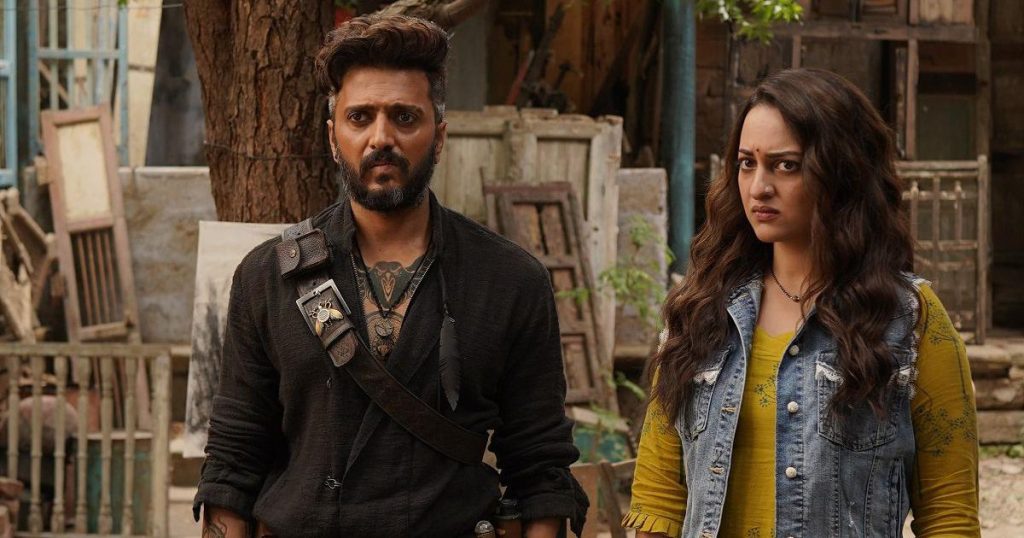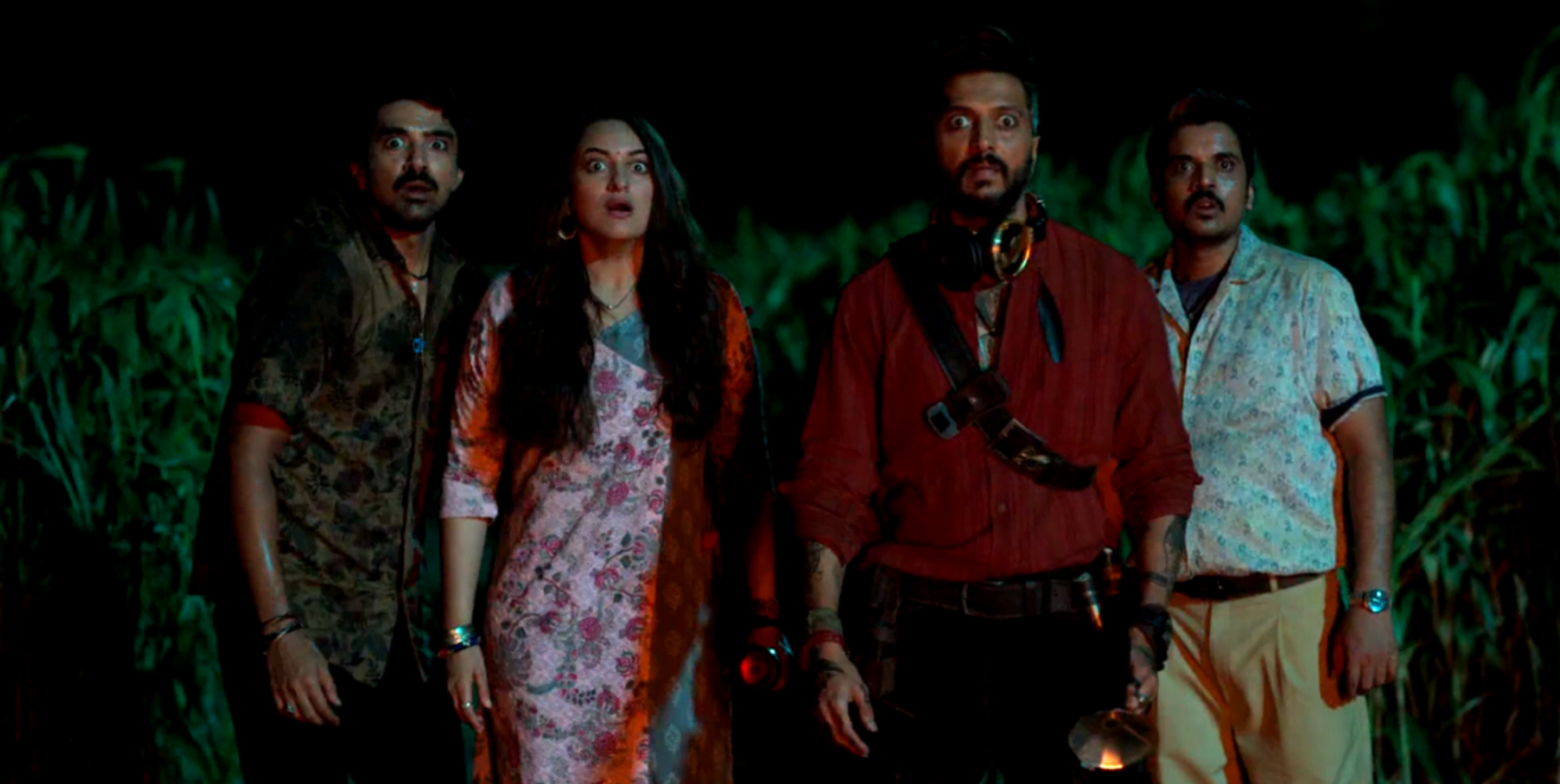Bollywood has a trend of presenting haunted stories where ghosts are shown as rebel creatures with destructive methods of taking revenge and harming innocent people. ‘Kakuda,’ a horror-comedy film released on 12 July 2024 reiterates the preset patterns of serving ghost stories with less brilliance and no originality.
Set in a remote village of Uttar-Pradesh, ‘Rathodi,’ the central plot orbits around a wormlike-dwarf ghost ‘Kakuda,’ who has a dangling cranium-shaped appearance covered by creepy skin. This bizarre spirit knocking on every door of the village, each Tuesday at 7:15 PM sometimes reminds us of ‘Stree,’ another film in the same genre in which the female ghost enters a village with scary warnings at a certain fixed time. In ‘Kakuda,’ male villagers who don’t open the door get kicked by the ghost, grow an ugly hump on their back and die within 13 days.
After ‘Munjya,’ released in June 2024, the film ‘Kakuda,’ is the second attempt of Marathi-Hindi director Aditya Sarpotdar in the comedy-horror niche. For actress Sonakshi Sinha, it’s her second effort in playing two characters after Bhansali’s ‘Heeramandi.’ Indira or Indu (Sonakshi Sinha) as a female lead loves a man ‘Sunny,’ (Saqib Saleem) from the village Rathodi. Their relationship is not accepted by either side due to irrelevant traditional reasons.
Consequently, the lovebirds plan to get married in a temple on Tuesday. Sunny fails to return home and open the door at the appropriate time. Later, all the pivotal characters shown in the film join to sort out the mystery of Kakuda to safeguard Sunny from the possible cursed death in 13 days as he becomes prey to the ill-famed ghost.
The chaotic plot of ‘Kakuda,’ lacks the drama, suspicion and thrill of the ‘Horror-Comedy,’ category. Mixing these components is not impossible but an art that is hard to dominate. Such anecdotes can either astonish the audience or distress them. Unfortunately, ‘Kakuda,’ has destroyed the cinematic allure while blending up two striking human emotions.
A dull film amid ‘pseudo-progressive‘ and ‘not-so-horrible‘ ambiguities
The depiction of fear on screen should intend to trace our hidden insecurities and unseen fears but most of the time haunted films have taken advantage of prevalent superstitions to grab some gazes. On this scale, ‘Kakuda,’ even fails to provide the temporary dopamine dose of ‘Bhay-Ras.’ The opposite gestures of fear and laughter don’t fruit in a reflective synthesis here but disrupt both streams.

Our surroundings are full of illiterate and educated people alike who chatter about the existence of ghosts and ‘Kakuda,’ runs on the same roadmap. Marriage, suicide, psychological disorder, sufferings, delusions or paranormal activities; shallow-pointless wobbles of comedy have ruined the essence of film without inciting much laughter.
The family members of Indira seem progressive enough to educate girls but they are not open-minded in the case of their elder daughter Gomti (Sonakshi Sinha) who is suffering from Somnambulism (sleepwalking). On the contrary, the irrational capitalist endeavours of finding an English-speaking groom for younger daughter Indira (Sonakshi Sinha-dual role) and imposing an unwanted marriage option on her seems offensive. Again the film confuses Sunny’s attempt to die by suicide in a distressing mental situation with weird giggles and funny ambience. Cracking jokes in situations that are ‘not so funny,’ and ignoring psychological traumas turn the film into horrible and a pseudo-progressive film that struggles to inflame dark comedy. Ambiguities fluttering on the canopy only depict the inability to distinguish and blend different sentiments with perfection.
The first part of the ‘Kakuda,’ can baffle the general predictions with the liberal approach of Indira who takes the lead as an educated female. Indu trying hard to medically cure the back-hump of her Husband when the entire village assumes Sunny’s death within the next 13 days looks like a rebel-women fighting with clueless beliefs. But the next segment of the film tosses the prospect. Throughout the early scenes, these narratives dangle between an unaesthetic paradox of becoming ‘horrible,’ and fighting the superstitions. Eventually, these confusions empower the superstitions with postmodern tools to boost them up.
Hollywood-obsessed Indian film-buffs have enough memoirs of ghost-hunters. Victor (Ritesh Deshmukh) also enters as a ghost-hunter, trying to look cool with bold-funky tattoos and a trendy hairstyle. Using technical instruments and methods to trace sound and vibration, the whole concept of Ghost-Hunting is based on pseudo-science to trace paranormal activities. Even if we adore the story for entertainment, Victor, with his different instruments to trace, catch and destroy Kakuda, seems like a miserable person who does not have in-depth knowledge of his work.
To follow Kakuda, the characters move from the field to ‘Kukku Pahelwan ki Haweli,’ and ‘Goyal Circus,’ to decode the mystery. Meanwhile, the past of ghost displayed in quick-animated clips explodes as a powerful story with loosely-knit details, failing to grab eyeballs. Thrills rooted in the story are often dull and numb, except for a few scenes where one can laugh a little.
The feminist ghost and anti-women subplots do not find adequate focus in Kakuda
Underlining the parameters of a patriarchal-sexist society, the subthemes of ‘Kakuda,’ seem more enchanting than the central one. Kakuda, previously known as Gullak, was a dwarf who worked in a circus. Blessed with great powers to heal the physical pain of people with his right foot, Gullak was rational enough to recognise the discriminations and exclusions in social structures. In the village ‘Rathodi,’ he received abundant love that compelled him to leave his profession and stay in the community. Being tormented by the beauty standards, dwarf Gullak had a soft corner for widows, women and people who face inequality.

The way villagers defamed Shiva’s mother, Ganga, by linking her name with Gullak and assassinating both of them is a story that demands separate attention and more space. Villagers burning the home of Gullak and compelling him to die outside, weave scenes with soul-stirring potential of questioning the rigid-rusted system. Gullak renders as a feminist ghost who respected women in his life and never harmed them in the spirit world.
The less focused plots of the lynching, honour-killing, defamation, injustice, discrimination, butchery and criminal psychology of society have not found enough space in the film. Summing up the crucial issues on the sidelines is a tactic of media that is slowly spreading into the conscious-unconscious flicks of filmmaking.
One can mumble ‘Ye duniya agar mil bhi jaye to kya hai,’ while pondering over the fate of Kakuda who perceived too much love and too much hate of blind masses, in a short life that was not so short. This ghost could have found a decent reformative or better interesting life with a well-cooked climax and good screenwriting.
Through the restricted-painful life and broken relationship of Gomti, the film also reveals the tyranny of women who suffer psychological vulnerabilities and live on the margins of what we identify as a ‘civilised society.’ Although the film has touched the horrible anti-human and anti-women tendencies of the world, it lacks options to hint towards a solution.
Kakuda as a one-time watch that lacks clarity and purpose
After mapping out every perspective, ‘Kakuda’ can be observed as a mediocre story where protagonists lack a subtle purpose making it cold and boring at times. Today’s audience is fascinated by science-based fictions that expand imagination and fruit into reflective conclusions. On the other hand, using science to encourage superstition is no less than a scandal in a country like India where psychological issues are deciphered as a ‘paranormal influence.’

However, the fictitious charm of films must not be confused with reality, facts or data for the sake of ‘art,’ but pushing the audience in the wrong direction in the name of science, history or politics comes under propaganda and conspiracy theories. The idea of finding freshness by replacing the eastern process of ‘Ojha-baba culture,’ with western-idea of ghost-hunting is not an artistic development.
Also, Indra does not make any sense by rejecting the irrational beliefs of villagers because further, the story strengthens the same superstitions with more illogical absurdity. Indra leads and leaves the story at a point that is neither horrible nor funny.
Released on a comparatively less popular OTT platform, Zee5, ‘Kakuda,’ can be considered as a one-time watch for the fragments it has not covered properly. Even after lacking clarity, purpose or entertainment hook, ‘Kakuda,’ is not a time-guzzler and it would not mess much with your purpose of watching cinema.
About the author(s)
Mariyam (she/her) has a thirst for significant stories that consist of humanitarian and feminist themes. She comes from Journalism, English Literature, and Political Science academic background.
For her, words are a visionary sovereignty to stand on and find the meaning of being while journalism is the only place where truth comes with facts and data. She also likes documentary photography, Rumi's spirituality, dreaming, and stargazing.





